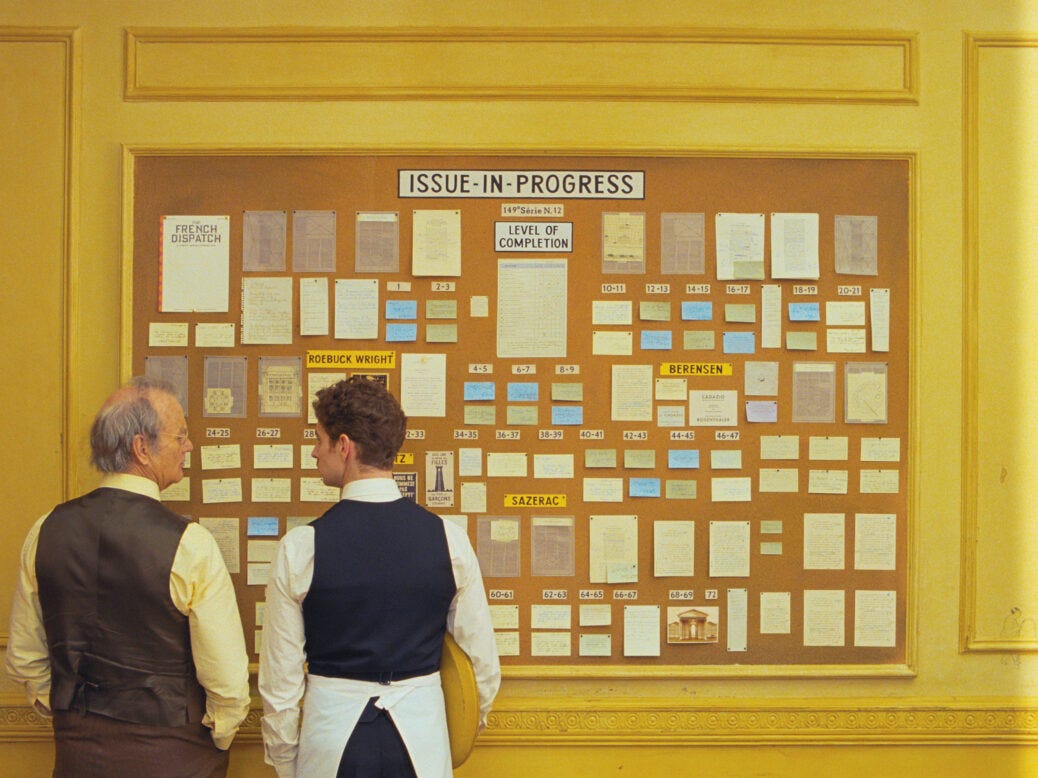Just wastebook and links this episode.
Wastebook
If you’re a writing type suffering from imposter’s syndrome, spend some time as an editor. You’ll soon discover that writing is incredibly hard, so if you can pull it off, you’re the real deal.
“Preview The Magnitude Of Our 2024 Agenda” - subject line of a Forrester email.
Alex: “So you want training data for my replacement?” Son: “Well, at least until they unfreeze your brain.” Here.
“‘Culture’ is a kind of catch-all in social affairs that can be deployed to explain almost everything everywhere, and so it usually explains nothing at all. If the advice your theory yields is “change the culture”, then you have no meaningful advice.” Here.
“A Man Was Ordered to Build a Fence to Hide His Boat. He Asked an Artist to Paint the Boat on the Fence” Here.
“business websites with personality” Here.
“While developer led motions are awesome, all roads eventually lead to steak 🥩 dinnahs and hard-core enterprise sales to pay the bills!” Here.
“Then he gets up from the table and shrimp fall out of his pockets and he walks out of the boardroom trailing shrimp everywhere, this is what corporate finance is all about.” $11m on shrimp.
“the classic difficult-childhood-because-his-parents-made-it-too-easy” Here.
‘Yet again, I kinda sort of understand what he’s saying, but I have no idea what any of that means in concrete reality beyond, “we will collect lots of data on inhabitants, and make adjustments based on patterns.” And again, I’m not sure you need a cyberpunk city to do that.’ Here, from 21,000 words on Saudi Arabia.
“Who the fuck wanted to spend 44 billion dollars on a toilet?” Burn Book.
We need more life advice books by people who don’t have time to write one.
“manufactured serendipity” Here.
"Be an active bystander."
Relative to your interests
What Factors Explain the Nature of Software - “The only way to know exactly what software we want to build is to fully specify it: without doing so, there will be gaps between our vague ideas and harsh reality. However, a complete, abstract specification is, in general, at least as much work as creating the software itself – in many cases, it is substantially more work.”
Vercel Momentum - “Vercel was started in November of 2015 so it has taken over 9 years to cross $100M ARR - one has to be patient in dev tools and it doesn’t always work out!!! Harness started in 2017 so it too took 7 years to cross $100M ARR, but it also had a more focused model to sell to larger enterprises as a devops infra provider from the very beginning.”
BP AI use for developer productivity - “A passing mention in BP’s latest quarter: 'Due to GenAI and in-house built developer productivity tools, we have increased the output of our software developers by around 70% year-over-year” and cut external developers by 60%.'"
The Forgotten War on Beepers - Back when pagers were ruining the youth.
Enterprises struggle to show the value of AI projects - “’Organizations who are struggling to derive business value from AI can learn from mature AI organizations,' Leinar Ramos, senior director analyst at Gartner, said in a statement. But it’s a small group: only 9% of respondents in Gartner’s survey are characterized as AI-mature.”
Gartner Forecasts Worldwide Public Cloud End-User Spending to Surpass $675 Billion in 2024 - Cloud: lots of money.
Crocodilia: How Crocs became a clog-selling profit machine - I need a pair!
As clicks dry up for news sites, could Apple News be a lifeline? - Wow! // “the Beast on track to make between $3–4 million in revenue this year from Apple News alone — more than its own standalone subscription program, and without much additional cost.”
The #1 Platform Engineering Problem You’ve Never Heard Of: Platform Decay (Webinar Recap) - Avoiding the accidental platform and platform sprawl. Gartner Identifies the Top Five Strategic Technology Trends in Software Engineering for 2024 - (1) Software Engineering Intelligence, (2) AI-Augmented Development, (3) Green Software Engineering, (4) Platform Engineering, (5) Cloud Development Environments. “Gartner predicts that by 2026, 80% of large software engineering organizations will establish platform engineering teams, up from 45% in 2022.” // What’s weird about this prediction is the question: “uh so what have the PaaS, DevOps, and SRE people been doing this whole time?”
Using AI to generate web forms from PDFs - With Enterprise AI, the app is still the hard part: “What took longer was the other stuff: identifying the problem, designing and building the UI, setting up the templating, routes and data architecture. It reminded me that, in order to capitalise on the potential of AI technologies, we need to really invest in the other stuff too, especially data infrastructure.” And: “What really slows transformation is bureaucracy. It’s getting permission to use a tool like this, and to make improvements to the underlying service.”
Internet use statistically associated with higher wellbeing, finds new global Oxford study - “The study analysed data from two million individuals aged 15 to 99 in 168 countries, including Latin America, Asia, and Africa and found internet access and use was consistently associated with positive wellbeing.” // At this point, who knows? Like everything else in life, it’s probably how you use it that matters.
Why We Hate Working for Big Companies - Capitalism knows the central planning committee is bad, so, logically, Capitalism runs on corporations that are central planning committees.
Everyone hates Workday - “Workday reveals what’s important to the people who run Fortune 500 companies: easily and conveniently distributing busy work across large workforces. This is done with the arbitrary and perfunctory performance of work tasks (like excessive reviews) and with the throttling of momentum by making finance and HR tasks difficult. If your expenses and reimbursements are difficult to file, that’s OK, because the people above you don’t actually care if you get reimbursed. If it takes applicants 128% longer to apply, the people who implemented Workday don’t really care. Throttling applicants is perhaps not intentional, but it’s good for the company.” // This gets close to something, but doesn’t have enough empathy (understanding?) of executive life to sound right. More like: the purpose of a large organization is to perpetuate itself as is. It only changes if there is a crisis or a huge improvement to be had (10x? 20x?). Workday is good enough: all the effort you would put into fixing it would just result in the same general outcomes. You would take on the risk of it failing, and get little improvement of things went well.
Conferences, Events, etc.
Talks I’m giving, places I’ll be, and other plans.
Atlanta Executive Dinner on Enterprise Software Dev, etc., May 22nd. SpringOne Tour London, June 5th. DevOpsDays Amsterdam, June 20th, speaking. NDC Oslo, speaking, June 12th. SpringOne/VMware Explore US, August 26–29, 2024. SREday London 2024, September 19th to 20th.
Discounts. SREDay London (Sep 19th to 20th) when you 20% off with the code SRE20DAY. And, if you register for SpringOne/VMware Explore before June 11th, you’ll get $400 off.
Logoff
I’m in Atlanta this week for two events (see the dinner one above). I’m in a Residence Inn this week - which has a kitchen (no oven, though). Usually I’d go to Whole Foods to eat from the hot bar for at least one meal, but this morning it wasn’t open yet. I realized I could just buy some eggs and salsa, and an avocado. I always buy avocados in the States: they are not good in Europe. I also realized I could buy a steak! (Hard to get American style steaks in Europe). Amazing!
//
I had a long conversation today about a gap in the enterprise software journalism and analysis world. There doesn’t seem to be enough reporting there - the focus is on crushing iPads more, AI now-a-days, sure. The problem with the space is, how do you make money publishing about it? A lot of companies end up getting sponsored by vendors, which is totally fine.
//
I also recorded an interview with JT Perry about Enterprise AI in healthcare. It was great! It should be out later this week.
//
On the way over here, some Americans complained about how hot it is. First, in Schiphol, then in the Atlanta airport SkyTram. What they meant was the AC wasn’t cool enough. Long ago, when I was traveling for RedMonk with James, he and the other Europeans would always complain about how cold it was in American conference rooms. They seemed insane. Who wouldn’t want cold AC? But now, living five years in Europe, I get it. I didn’t even feel like it was warm. And when I walked into my hotel room, it was freezing! I turned it up from 60 degrees to 70, and that seemed right. I still like cold AC, regardless of tempature. The crispness is impossible to get otherwise.
//
That Gartner prediction about platform engineering above (“Gartner predicts that by 2026, 80% of large software engineering organizations will establish platform engineering teams, up from 45% in 2022.”) has really “chipped my chops” as one of my friends like to say. There’s something weird with the current conversation around platform engineering. I get all the newsletters on the topic, read all the stuff. As I mentioned above, what have we been doing this whole time with “platforms”? Did they not exist?
Here, we have Paula and Colin talking about platform as a product in 2019. The book Team Topologies was out in 2019. A year before that, 2018, you had the Bottcher/Thoughtworks definition of platform. Cloud Foundry was released around 2011, and was at the beginning of its stride in 2015. There’s Heroku, of course, the late 2000s. And then DevOps, SRE, and centralized tools groups of Netflix and Google fame spread through-out there. I guess that’s five years since 2019. Of course, those ideas were germinating for 2 or three years ahead of that (just proposing a book, getting a book accepted, writing a book, and then waiting for it to come out probably took a couple years, 18 months at least?).
It seems weird. Lots of people don’t even automate their build. One surveys says that only 35% of respondents apps are are using DevOps for management. So maybe it is actually something new? Rather, maybe actually doing it is something new.
I look at these years of conversation about the platform topic and I get a little queasy: are we just going to keep talking about this over and over, giving it new names here and there? Are enterprises giving themselves the chance to see their “transformations” through to fruition? It feels like introducing a platform into a large organization, in a big way, takes three years, maybe even five.
I’m not sure: but there’s a good conference talk in there! Maybe I can work it out for my upcoming “Developer Productivity Is Waste” talk (NDC Oslo and then DevOpsDays Amsterdam). The premise would be something like “developer productivity is a symptom, a signal of actual problems. It’s just how you measure something, not an ends to itself.” I mean, I guess that’s the problem with any metric: when you think improving it is the point. The point is actually “why aren’t we doing better, and how would we fix it.”
In the case of all this platform stuff, based on how “new” platform engineering is, and the other surveys I’ve looked at recently (low CI/CD usage, low DevOps usage), the answer seems like: because you’re not doing much to improve it.
Really up-lifting stuff!


